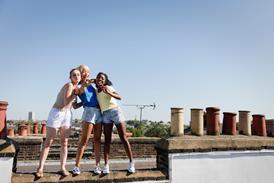The easiest thing to do when watching EDL Girls: Don’t call me racist on BBC 3 last night would have been to laugh. Take 18 year-old Amanda: the girl who called a night at the pub with the EDL, ‘Literally…the best evening I’ve ever, ever had.’ The other easy way out of the documentary would be to patronise and pity these naïve, daft northern girls who hang out with racists to meet boys. But this documentary, focusing on young female members of the far-right, Islamaphobic, and allegedly-racist English Defence League, demands more nuance than that.
Amanda found hope, solace and community in the EDL ‘family’. She was undeniably naïve (‘Two weeks ago, I didn't know what the EDL was, but I always thought Muslims were wrong…trying to bomb us’). She seemed to get her education from the most terrifying corners of Twitter, and genuinely didn’t see a problem with a selfie of herself posing as Hitler on Facebook. But worse than the naivety was the hopelessness; she wasn’t concerned about getting ‘battered’ on an EDL protest because ‘everyone gets battered in the street’.
In my article for Youthwork last month ,I suggested that young people are still desperate to find a place to belong and a cause of believe in, and that, for many young people, popular culture has become a ‘church’ to provide these things. What last night’s documentary showed, is that young people are indeed searching for belonging, and for a section of young people, the EDL is offering something that the rest of society cannot. That’s not to say Amanda is blameless - there was clearly a degree of ignorance and bigotry in her thinking - but it was the community and the sense of something to believe in that attracted her to the EDL, not the ideology. Amanda was captivated by ‘the chants’, and keen to invite everyone she knew, including prospective boyfriends. The group was united by a sense of being let down by ‘their’ country, and brought together by a sense of indignity directed at the ruling powers. Perhaps if society continues to ignore and disenfranchise young people, they’re going to find a place that accepts them and gives them an easy scapegoat for their anger, drifting into the extremes of society. If wider society fails to give young people a voice, they’re going to find somewhere that does.
This far-right is something that youth workers have to fight in the name of love, community and tolerance. The group shouting about creeping Islamic dangers in society is itself a creeping danger in society. One scene last night showed a high-street full of Christian preachers, a ‘Qur’an roadshow’ and an EDL protestor in the middle. Sixteen year-old Katie, whose step-dad was protesting, summed it up neatly by calling it: ‘A debate nobody is going to win’. Nobody comes out of that situation well; the fight against intolerance will be at its most dangerous if it descends into a shouting match. Young people are desperate to have their voice heard; we need to ensure that voice is channelled in the right direction. The way to prevent young people buying into a far-right ideology isn’t by shouting louder - it’s by offering young people something better to be part of.






































